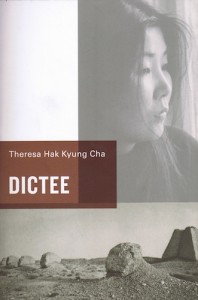Not so much reviewed as righteously trampled (link here). Fortunately, the trampling is supported with two passages from the book that reveal the reviewer, Philip Gowman (who writes quite consistently for KLL), to be spot on. Gowman struggles manfully with the text, even ranging far afield and invoking Homer’s Muse as a possible answer to Dictee‘s incoherence. Alas, Gowman notes:
before assistance can arrive, we get more puzzling words: fragments of French school exercises interspersed with a Lenten recitation from the Catholic Catechism.
and concludes:
the end result is totally unreadable.
It is a good review of a bad book, which is a rare thing. It is completely worth reading.
Also, a brief glance at the internet reveals that even the book’s supporters are forced to deal with its incoherence:
What makes DICTEE idiosyncratic, unforgettable,is its variance, its slipperiness. It has the acute proclivity to dissipate, both physically on the page, as well as connotatively. At times, the text acts as both prose and poetry; its liminality becomes interwoven into a book that functions like the structuralist films[1] Cha was influenced by. Physically thumb thru DICTEE and it even looks like a structuralist film. The length of text varies, with interjected moments of white (blank pages) and images (photographs, documents, diagrams). A fragmented jaggedness makes the book a visceral experience.
The English translation of all that cant? “It makes no sense.”



